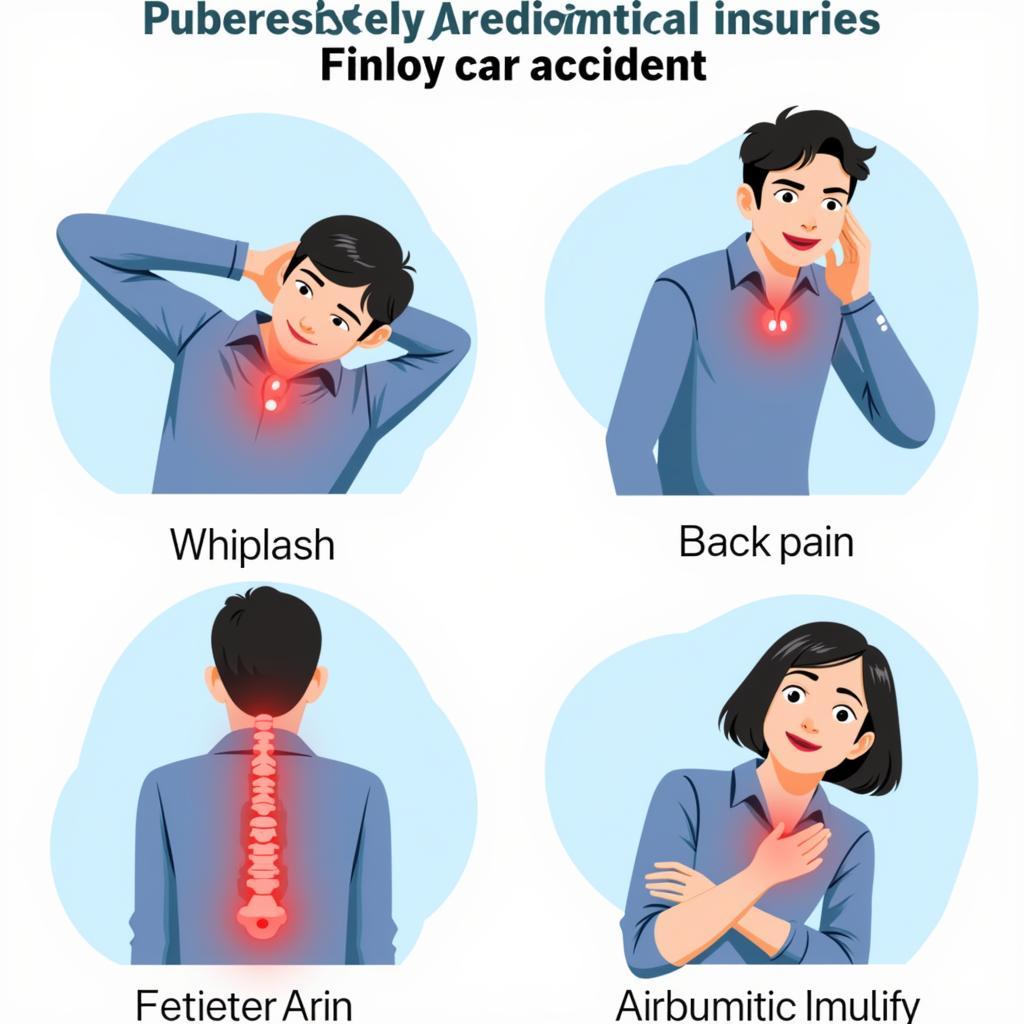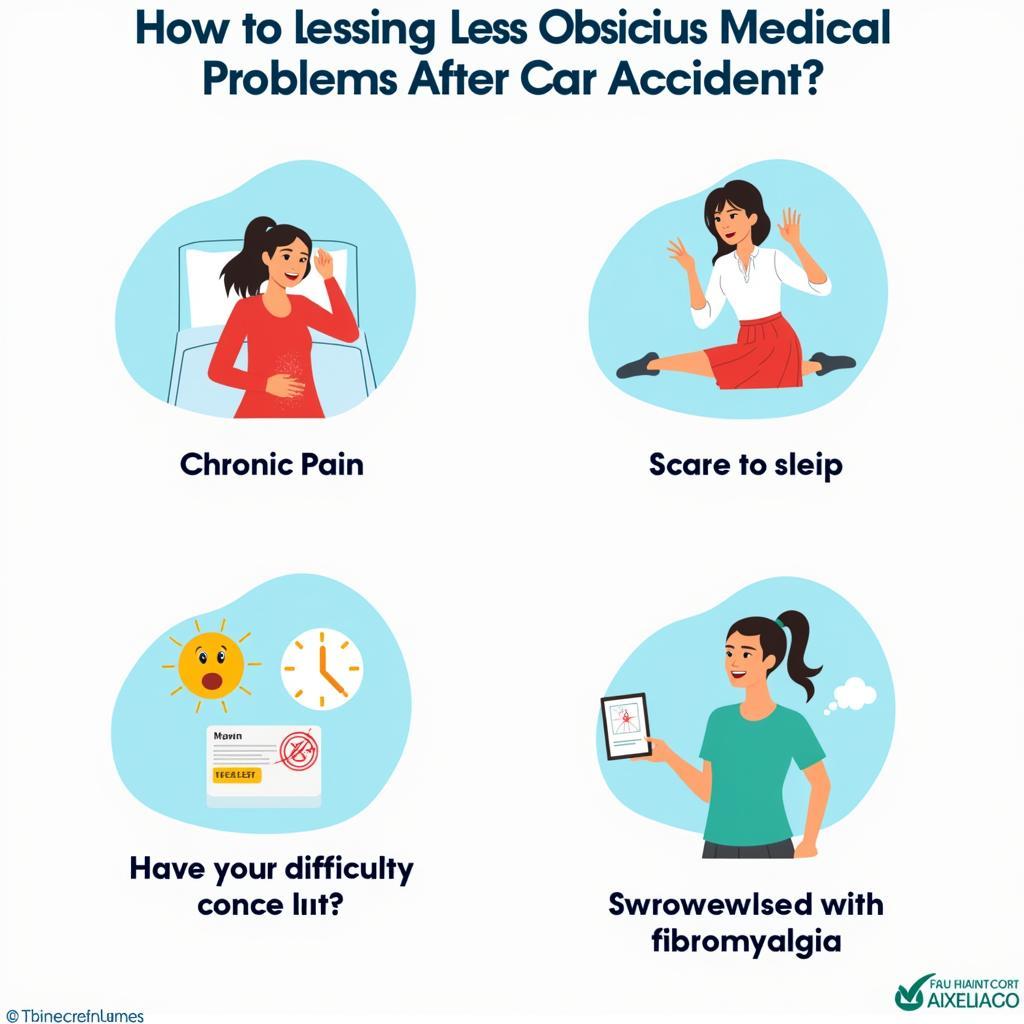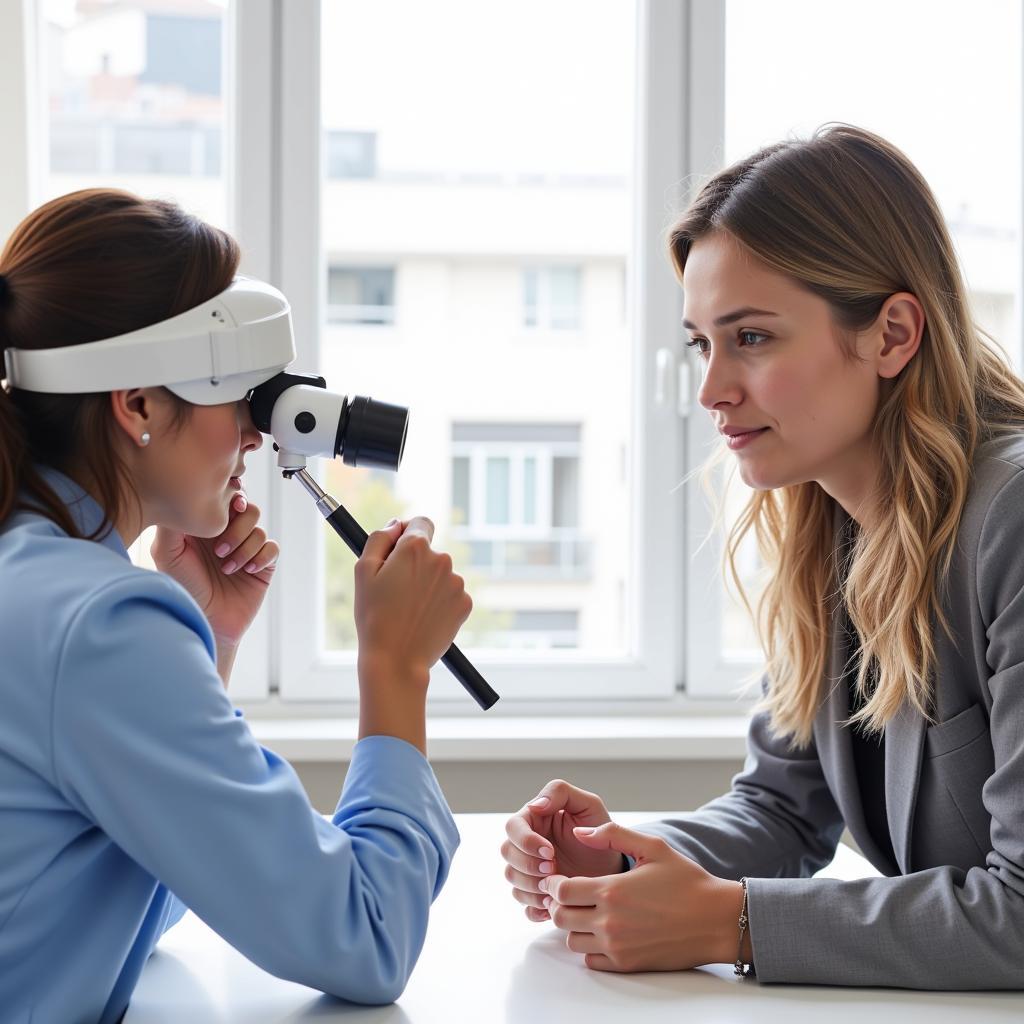Car accidents, even seemingly minor ones, can lead to a surprising array of medical problems. Understanding these potential issues is crucial for both those involved in accidents and those who support them, including family, friends, and medical professionals. This comprehensive guide explores the various medical problems that can arise after a car accident, from the immediately obvious to the more subtle and long-lasting.
After a car accident, it’s essential to seek medical attention, even if you feel fine. Some injuries, like whiplash or concussions, may not show immediate symptoms. Prompt medical evaluation can help identify and address these issues before they become chronic problems. Similar to problems with my car insurance company, dealing with medical issues after an accident can be complex and challenging.
Common Physical Injuries After a Car Accident
Physical injuries are often the most immediate and apparent consequence of a car accident. These can range from minor cuts and bruises to severe traumatic injuries. Some common examples include:
- Whiplash: This common neck injury occurs due to the sudden back-and-forth movement of the head during impact. Symptoms include neck pain, stiffness, headaches, and dizziness.
- Back Injuries: Ranging from muscle strains to spinal cord damage, back injuries can be debilitating and require extensive rehabilitation.
- Broken Bones: Fractures can occur in any part of the body, with the arms, legs, and ribs being particularly vulnerable.
- Traumatic Brain Injuries (TBI): These injuries, ranging from mild concussions to severe brain damage, can have significant long-term consequences. Symptoms can include headaches, memory problems, and difficulty concentrating.
 Common Car Accident Injuries: Whiplash, Back Pain, Broken Bones, and TBI
Common Car Accident Injuries: Whiplash, Back Pain, Broken Bones, and TBI
Psychological Trauma After a Car Accident
Beyond the physical injuries, car accidents can also cause significant psychological trauma. The emotional distress following an accident can be just as debilitating as physical pain.
- Post-Traumatic Stress Disorder (PTSD): Experiencing or witnessing a car accident can trigger PTSD, leading to flashbacks, nightmares, anxiety, and avoidance of driving.
- Anxiety and Depression: Feelings of anxiety and depression are common after a car accident, particularly if the accident resulted in serious injury or loss of life.
- Phobias: Some people develop phobias related to driving or being in a car after an accident. This can severely impact their daily life and mobility.
Similar to why problem with concentration during car driving can arise from various factors, the psychological impact of a car accident can stem from a combination of physical pain, emotional distress, and the fear of future accidents.
Less Obvious Medical Problems
Some medical problems may not manifest immediately after a car accident. These can be difficult to diagnose and often go unnoticed until they become more severe.
- Chronic Pain: Lingering pain, even after injuries have seemingly healed, is a common complaint after a car accident. This can be due to nerve damage, scar tissue, or other underlying issues.
- Sleep Disturbances: Difficulty sleeping, nightmares, and insomnia are common after experiencing a traumatic event like a car accident.
- Cognitive Impairment: Memory problems, difficulty concentrating, and slowed thinking can be signs of a TBI or other neurological issues.
- Fibromyalgia: This chronic pain syndrome can be triggered by trauma, including car accidents.
 Less Obvious Medical Problems After a Car Accident: Chronic Pain, Sleep Disturbances, Cognitive Impairment, and Fibromyalgia
Less Obvious Medical Problems After a Car Accident: Chronic Pain, Sleep Disturbances, Cognitive Impairment, and Fibromyalgia
Just as insurance problems with aftermarket car seats can arise unexpectedly, some medical problems after a car accident might not be immediately apparent. It’s crucial to monitor your health closely and report any unusual symptoms to your doctor. Similar to car accident thyroid problems, these less obvious medical problems can significantly impact your quality of life.
Seeking Medical Help and Legal Advice
If you have been involved in a car accident, it’s essential to seek medical attention immediately, even if you feel fine. Early diagnosis and treatment can prevent long-term complications. You should also consult with a legal professional to understand your rights and options regarding compensation for your injuries and losses. Car insurance problem can be complicated, so seeking professional advice is essential.
 Seeking Medical and Legal Help After a Car Accident: Doctor Examination and Legal Consultation
Seeking Medical and Legal Help After a Car Accident: Doctor Examination and Legal Consultation
Conclusion
Medical problems after a car accident can be complex and far-reaching. Understanding the potential physical and psychological impacts is crucial for seeking appropriate medical care and legal advice. Early intervention and ongoing support can help individuals recover from their injuries and regain their quality of life. For further assistance or questions, please connect with us at AutoTipPro. Our phone number is +1 (641) 206-8880 and our office is located at 500 N St Mary’s St, San Antonio, TX 78205, United States.
FAQ
- What should I do immediately after a car accident? Ensure safety, call emergency services if needed, and seek medical attention.
- How long can symptoms of whiplash last? Whiplash symptoms can last for weeks, months, or even years in some cases.
- Can I develop PTSD even if I wasn’t seriously injured? Yes, PTSD can develop after any traumatic event, regardless of the severity of physical injuries.
- What are the signs of a concussion? Headaches, dizziness, confusion, and memory problems are common signs of a concussion.
- How can I manage chronic pain after a car accident? Pain management strategies include medication, physical therapy, and alternative therapies.
- Should I see a therapist after a car accident? Seeking therapy can help address psychological trauma and cope with the emotional aftermath of an accident.
- What are my legal rights after a car accident? You may be entitled to compensation for medical expenses, lost wages, and pain and suffering. Consult with a lawyer to understand your rights.




Leave a Reply